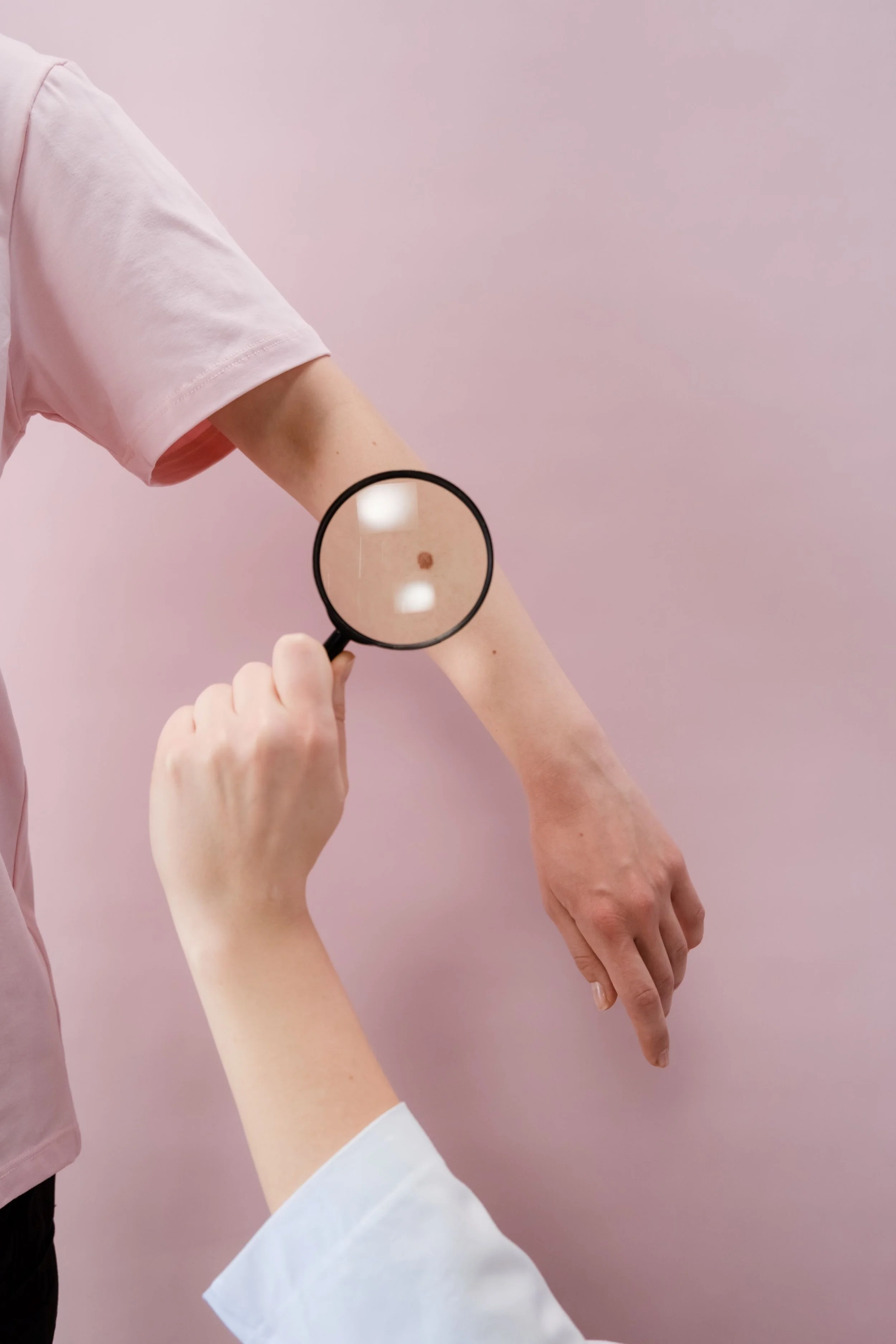
General Dermatology
Dermatological Treatments for all your Skin Diseases or Infections
-

Acne Treatment
Acne can occur at any age but mainly occurs in adolescents and young adults. It is an inflammatory disease of the pilosebaceous follicle and different factors are involved in its pathogenesis. Treatment depends on the type of acne and its severity. There are different options of topical treatments and systemic medications.
Treatment requires time and perseverance because it can take many months to cure all the symptoms of the disease. Treatment is often complemented by additional treatments (laser, chemical peels) aimed at removing post-inflammatory scars and blemishes. Proper skin care at home also plays an important role in the treatment of acne.
-

Skin allergies
Different types of allergies can manifest themselves on the skin. Among the most common allergic diseases are: urticaria, atopic dermatitis and contact eczema. In the treatment process, it is important to determine the potential allergen causing skin lesions.
-

Hair loss
There are many causes of alopecia. Some may be genetically determined, such as male androgenic alopecia and female androgenic alopecia, and some may be autoimmune, such as alopecia areata. Stress, nutritional deficiencies, some diseases and medications and even the way you style or care for your hair can also cause hair loss. Making the correct diagnosis and treatments usually helps to achieve hair growth or stop the process of hair loss. In diagnosing hair loss, the standard examination is trioscopy, i.e. a non-invasive method during which the scalp, hair follicles and hair shafts are evaluated under magnification. The method of treatment depends on the type of hair loss. Oral treatment is often combined with scalp mesotherapy. In recent years, there have been significant advances in the treatment of hair loss, especially in patients with androgenetic alopecia and alopecia areata.
-

Skin cancer
Among skin cancers, the most dangerous cancer is melanoma, which can develop from existing moles on the skin, but also as a completely new change, initially resembling a typical mole. Melanoma is a fast-growing cancer that metastasizes. Detected at an early stage, it gives a full chance of recovery, which is why it is so important to regularly examine moles (dermatoscopy).
Among non-melanoma skin cancers the most frequent are basal cell carcinoma and squamous cell carcinoma. The main cause is ultraviolet radiation, so most form on parts of the body exposed to the sun, especially in people over 50 years of age. Early detection also involves regular dermoscopic examinations.
-

Seborrheic dermatitis
Seborrheic dermatitis is a chronic inflammatory skin disease. It is one of the most frequent causes of dermatological consultation. It is characterized by erythematodescamative, superficial lesions in seborrheic areas: scalp, eyebrows, nasolabial folds. Factors such as stress, infections, sudden climatic changes can aggravate outbreaks of seborrheic dermatitis. Treatment in most cases is topical. Patients in periods of symptom remission often require maintenance treatment to prevent further outbreaks of the disease.
-

Hyperhydrosis
Excessive sweating (hyperhydrosis) is a very common problem among patients. It often affects localized areas of the body: hands, feet, armpits, but in some cases it is generalized. It can be so abundant that sometimes it can become a work and social problem. Nowadays, we have many methods to treat hyperhidrosis. When topical products do not help, depending on the area of the body, botulinum toxin injections, iontophoresis, laser treatments or oral treatment may be considered. In rare cases, patients are referred for sympathectomy, which is a surgical treatment.
-

Skin infections
Skin infections can be caused by bacteria, viruses or fungi. Common bacterial skin diseases include impetigo and boils. Viral skin diseases include herpes simplex, herpes zoster, molluscum, warts. Fungal diseases are most often caused by dermatophytes or yeasts and can affect both skin and nails (onychomycosis).
-

Melasma
Melasma or chloasma is characterized by acquired hyperpigmented brown lesions located in photoexposed areas, mainly on the face. It is more frequent in brown-skinned people living in sunny areas. Triggering factors include sun exposure, pregnancy, oral contraceptives and some other drugs. At present there is no definitive treatment for melasma because the lesions tend to reappear. Treatments include pigment lightening creams mainly based on hydroquinone, chemical peels, microinjections, pulsed light, laser and oral treatment with tranexamic acid. Regardless of treatment, photoprotection is essential in all patients.
-

Nevus
Nevus examination (dermatoscopy) is performed using a special magnifying glass, called a dermatoscope. Regular checking of moles at the dermatologist provides an opportunity to detect skin cancers early and thus apply a treatment that will give you a full chance to recover. Regular nevus checkups are especially important in people of light phototype, who have suffered sunburn in childhood, people with many moles, relatives of people who have had a melanoma.
-

Psoriasis
Psoriasis is a chronic, inflammatory disease that manifests itself in scaly plaques located mainly on the elbows, knees and scalp. There is a certain genetic predisposition to develop lesions. Factors such as stress, alcohol, infections or some drugs can aggravate psoriasis outbreaks. Treatment depends on the severity, extent and clinical type of the disease. Most cases are treated with topical medications and phototherapy but in more advanced cases systemic treatments are considered including a new generation of drugs called biologic drugs.
-

Pruritus
Itching (pruritus) is one of the most common symptoms of skin diseases. It usually accompanies most dermatological diseases, but it can also be the only symptom. This is a very annoying symptom that can greatly affect daily life. The diagnostic challenge is itching, which is initially not accompanied by any skin lesions, especially when it is intense and generalized. A patient with such a symptom requires diagnostic processing, as it may be the first symptom of other diseases, but not always. Isolated itching is often associated with excessively dry, hypersensitive and irritated skin and may affect different sites, including the intimate area. Treatment for itching depends on its cause and severity.
-

Rosacea
Rosacea is a common, chronic skin disease in which erythema, inflammatory papules, pustules and telangiectasias (small, permanently dilated blood vessels) appear on the face. Depending on the type of skin lesions, four types of rosacea are distinguished. The disease usually occurs in middle-aged adults. The main role in the formation of the disease is played by genetic predisposition associated with excessive reactivity of small blood vessels in the skin of the face, which leads to their dilatation and secondarily to inflammation. Treatment methods are different and depend on the symptoms. In therapy, topical medications, oral or laser treatments can be used. It should be remembered that rosacea is a chronic condition. We can treat existing skin lesions, but patients often have flare-ups. In order for flare-ups to occur as little as possible, it is extremely important to observe principles of proper skin care and avoid exacerbating factors, i.e. those that contribute to excessive dilation of blood vessels. Photoprotection of the facial skin (sun creams) is extremely important. A major challenge in the treatment of rosacea is facial erythema, which usually does not disappear with the use of topical and oral medications. An effective method of clearing existing erythematous lesions is laser treatments, usually performed serially (every few weeks). Telangiectasias can also be eliminated using laser or electrocoagulation.
-

Warts
Warts are the most common clinical manifestation of human papillomavirus (HPV) infection. They are contagious and very frequent in children but can occur at all ages. There are many types of HPV, giving rise to different types of warts. The most commonly used treatments are topical keratolytics and liquid nitrogen cryotherapy.
Are you looking for a specialist dermatologist in Barcelona, who speaks English and Spanish, to treat your skin, hair and nail problems?
Do you have redness, itchy skin, juvenile acne, hormonal acne, melasma, psoriasis, rosacea, severe itching, fungus, unusual hair loss, or skin infections?
Don't wait any longer to take care of yourself! Get your appointment with the dermatologist Dr. Monika Heisig, at the Dermik Clinic in Barcelona or at the Hospital Universitari General de Catalunya Sant Cugat, to help you with your needs in prevention, diagnosis and treatment of skin, hair and nail diseases.nails.